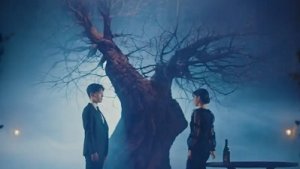Cette critique peut contenir des spoilers
Start-up let down by not focusing on its best character
I'm very conflicted about this show in that whilst it's generally very good, occasionally excellent, it suffers from a glaring kdrama problem that it just got pulled deeper and deeper into.
The main issue for the show is that it had two highly interesting subplots created by two very different conflicts for the main character Dal-mi, embodied ultimately in two characters who happened to be more interesting than her - through no fault of her own.
The first, and fundamental problem, is her sister In-jae. She is arguably the most interesting character in the show and yet is an afterthought for most part of the show, someone who appears sporadically in moments to unsettle and fluster Dal-mi before disappearing for the rest of the episode.
She is the show's standout character for someone who exists on its periphery. Her conflicted relationship with her sister, her mother, her stepfather, even how she feels about her late father and grandmother could have really tugged at the heartstrings in displaying the similarities and differences between her and her sister. The story of a rich girl determined to make it alone and not off her dad's wealth - faced with the inner anguish of secretly wishing she had stayed with her sister - is far more interesting than a love triangle. This should have gotten far more screen-time. Start-up suffered in her absence and thrived when she was in the room.
The other problem, which sort of explains In-Jae's limited time, is Do-san. The nature of his role in this show necessitates him having such a large amount of screen-time. This is the problem of Start-Up. It has two very interesting plot conflicts that compete against each other for time, and suffer. Do-san's role in this story during the first half was defined by a burgeoning romance and a complicated love triangle forming that simply put, was not as interesting as Do-san's own inner conflicts. His need to prove himself to his family, to be the man he thought Dal-mi viewed him as, coupled with his own rising guilt of repressing the truth of a conspiracy he was dragged into, was more interesting than seeing a love triangle taking place.
Do-san's character was portrayed really well, and he was easily far more likeable a character than Ji-pyeong - who often came across as nefariously scheming and mean-spirited- but the show really didn't know how to explore Do-san's betrayal without having a love triangle. This took away screen-time from the audience seeing more of who Do-san was and of simply giving us more moments with him and Dal-mi.
The love triangle just didn't have to exist. This conflict could have been explored through Ji-pyeong viewing Dal-mi in a platonic way. Far more interesting than his feelings for her was his sense of debt and guilt towards her grandmother. I think had the show pursued this road instead, and given us more time to see In-jae, it would have been far better.
Speaking of Ji-pyeong, there was a very strange introduction of a new setback for him involving one of the Samsan Tech's developers. When you watch it, you realise it's strange and feels as though it was lobbed in there simply for drama. It simply wasn't required and made the support cast even more underwhelming. Again, it's screen-time that the show should have given to fleshing In-jae out or showing Do-san's life of feeling like a disappointment.
Aside from the characters, what I didn't like was the sheer lack of fallout from certain things. The big secret that Dal-mi eventually had to find out barely left an impact on her relationship with others. It's hard not to feel as though the opening half of the show, which was genuinely impressive, was let down badly by the episodes from the midpoint onwards. At that point, it felt like the show was in a state of managed decline where even though scenes and episodes still retained humour, emotional punch and good dialogue, I couldn't escape the disbelief of how quickly the very big gaping plot conflict of the show was handled.
That's a lot of negatives for a show I generally really enjoyed! The positives are that all of the main characters are hugely likeable and depicted well. Dal-mi isn't the standout character in that she's a very conventional protagonist, but she does her part supremely well, and is engaging in how embattled she is, and how much she perseveres. The show explores her relationships to various characters well, and it also has some really touching moments, such as what fuels Do-san's vision for the company.
I thought Dal-mi's grandmother was a fantastic piece of the show, and far more integral. I appreciated the sprinkles of memories of Dal-mi's father over the show, and how it virtually affected everyone. And whilst I wish that had received more attention, it was still written very well. I can't fault the dialogue either. Generally it was very grounded and realistic.
There are some stellar episodes: 7 through to 9 were particularly fantastic, compensating for the show slightly stalling in the 5th and 6th with some forgettable episodes (featuring unnecessary secondary character drama). Its's worth noting that in those stellar moments, it's typically Do-san and In-jae who shine the brightest for me.
The main issue for the show is that it had two highly interesting subplots created by two very different conflicts for the main character Dal-mi, embodied ultimately in two characters who happened to be more interesting than her - through no fault of her own.
The first, and fundamental problem, is her sister In-jae. She is arguably the most interesting character in the show and yet is an afterthought for most part of the show, someone who appears sporadically in moments to unsettle and fluster Dal-mi before disappearing for the rest of the episode.
She is the show's standout character for someone who exists on its periphery. Her conflicted relationship with her sister, her mother, her stepfather, even how she feels about her late father and grandmother could have really tugged at the heartstrings in displaying the similarities and differences between her and her sister. The story of a rich girl determined to make it alone and not off her dad's wealth - faced with the inner anguish of secretly wishing she had stayed with her sister - is far more interesting than a love triangle. This should have gotten far more screen-time. Start-up suffered in her absence and thrived when she was in the room.
The other problem, which sort of explains In-Jae's limited time, is Do-san. The nature of his role in this show necessitates him having such a large amount of screen-time. This is the problem of Start-Up. It has two very interesting plot conflicts that compete against each other for time, and suffer. Do-san's role in this story during the first half was defined by a burgeoning romance and a complicated love triangle forming that simply put, was not as interesting as Do-san's own inner conflicts. His need to prove himself to his family, to be the man he thought Dal-mi viewed him as, coupled with his own rising guilt of repressing the truth of a conspiracy he was dragged into, was more interesting than seeing a love triangle taking place.
Do-san's character was portrayed really well, and he was easily far more likeable a character than Ji-pyeong - who often came across as nefariously scheming and mean-spirited- but the show really didn't know how to explore Do-san's betrayal without having a love triangle. This took away screen-time from the audience seeing more of who Do-san was and of simply giving us more moments with him and Dal-mi.
The love triangle just didn't have to exist. This conflict could have been explored through Ji-pyeong viewing Dal-mi in a platonic way. Far more interesting than his feelings for her was his sense of debt and guilt towards her grandmother. I think had the show pursued this road instead, and given us more time to see In-jae, it would have been far better.
Speaking of Ji-pyeong, there was a very strange introduction of a new setback for him involving one of the Samsan Tech's developers. When you watch it, you realise it's strange and feels as though it was lobbed in there simply for drama. It simply wasn't required and made the support cast even more underwhelming. Again, it's screen-time that the show should have given to fleshing In-jae out or showing Do-san's life of feeling like a disappointment.
Aside from the characters, what I didn't like was the sheer lack of fallout from certain things. The big secret that Dal-mi eventually had to find out barely left an impact on her relationship with others. It's hard not to feel as though the opening half of the show, which was genuinely impressive, was let down badly by the episodes from the midpoint onwards. At that point, it felt like the show was in a state of managed decline where even though scenes and episodes still retained humour, emotional punch and good dialogue, I couldn't escape the disbelief of how quickly the very big gaping plot conflict of the show was handled.
That's a lot of negatives for a show I generally really enjoyed! The positives are that all of the main characters are hugely likeable and depicted well. Dal-mi isn't the standout character in that she's a very conventional protagonist, but she does her part supremely well, and is engaging in how embattled she is, and how much she perseveres. The show explores her relationships to various characters well, and it also has some really touching moments, such as what fuels Do-san's vision for the company.
I thought Dal-mi's grandmother was a fantastic piece of the show, and far more integral. I appreciated the sprinkles of memories of Dal-mi's father over the show, and how it virtually affected everyone. And whilst I wish that had received more attention, it was still written very well. I can't fault the dialogue either. Generally it was very grounded and realistic.
There are some stellar episodes: 7 through to 9 were particularly fantastic, compensating for the show slightly stalling in the 5th and 6th with some forgettable episodes (featuring unnecessary secondary character drama). Its's worth noting that in those stellar moments, it's typically Do-san and In-jae who shine the brightest for me.
Cet avis était-il utile?









